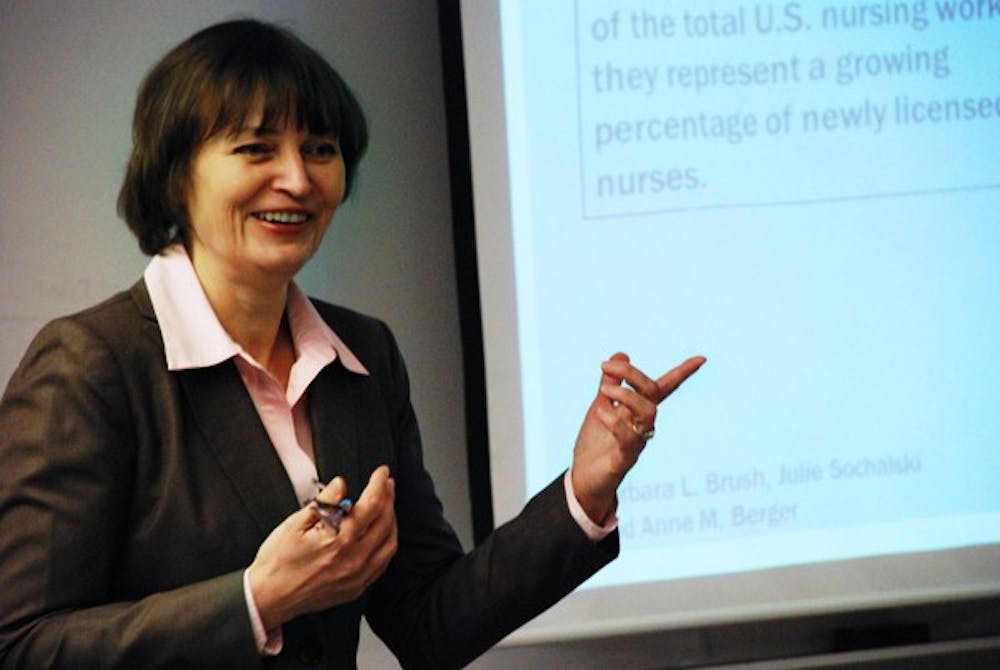Journalism professor brings international approach to CMU; wins scholar award

Journalism is a tool used universally to educate the masses and keep an eye on those who hold power.
Despite being a common structure across the world, the field’s specifics vary from country to country.
Elina Erzikova knows firsthand about the practice of journalism in both her native country of Russia and the U.S., which she calls home today.
Growing up in Uzbekistan, she experienced the evolution of journalism as the country gained and lost its freedom of the press.
Mikhail Gorbachev allowed the press to gain freedom when he came to power in 1988, but since then, Vladimir Putin has moved Russian journalism backward.
“Like a flashback, censorship has begun again,” Erzikova said. “Today, the Russian government has been successful in framing people who question and challenge their regime as unpatriotic.”
Aside from the extended freedom, American journalism serves its audience differently as well.
“The western audience wants to get news, but not opinion,” Erzikova said. “They say ‘Give me facts and I can figure out for myself what to do with the information.’
“Russians, on the other hand, look at journalists as conversation partners,” she said. “They want you to communicate your opinion, though of course it should be based on facts.”
Erzikova said she doesn’t see one form as better or worse than the other, but rather each nation acts to fulfill the desires of its audience.
During time of war, Russian journalists’ responsibilities expand past simply writing.
“Journalists were physically present in the warzone, so imagine how much respect these journalists had that rebels negotiated with them,” Erzikova said. “The rebels would not negotiate with the Russian government, but would with journalists.
The Russian native suffered a culture shock when she came to the U.S. nine years ago.
While working for a Russian newspaper, she did public relations work for an orphanage and an HIV and AIDS nonprofit organization.
“In Russia, journalism is public relations,” she said. “You don’t have advertisers. You have government resources and you become a PR agency for the government with a contract to cover their activities.”
Making her mark at CMU
Erzikova moved to the U.S. in 2003 after earning her bachelor’s degree from Tashkent State University.
She continued her education by attending the University of Alabama, where she earned her master’s degree and Ph.D in mass communications with an emphasis on international journalism and public relations.
In 2008, Erzikova attended a job fair in Chicago where she met Maria Marron, chairwoman of the journalism department at Central Michigan University.
Of the potential employers she talked to, Erzikova said Marron impressed her the most because she was personal, rather than bringing salary up to initiate conversation.
“She said ‘We are in Michigan’ and pointed to her hand,” Erzikova said. “I liked how she started conversation with that — it was very personal. Tell me something personal, something interesting.”
Erzikova applied and began working for CMU in 2009 as a journalism and public relations professor.
“She brings enormous enthusiasm for teaching and research to the department,” Marron said. “She encourages her students to think and work creatively, and, to quote her, she lives for research.”
Tim Boudreau, an associate professor of journalism, said Erzikova gives both the staff and students a more global perspective.
“To see the world from the eyes of a non-American can broaden perspective and be beneficial,” Boudreau said. “The department prides itself on being very diverse and she adds a great deal to that.”
The Association for Education in Journalism and Mass Communications recently named Erzikova a 2012 emerging scholar.
“The award is a significant honor for her,” Marron said. “Elina loves to do research and teach and she gets to spend her time doing that.”
The AEJMC selected four of the 35 submitted proposals to win the award, each receiving $2,500 to be used for research.
Erzikova’s research aims to discover why Soviet Union journalists were so submissive to the authority and yet subversive at the same time.
“The Soviet journalists would not name a particular problem, spelling it out, but would hint at it because Soviet censorship was strict enough not to allow subversive words to be printed,” she said.






